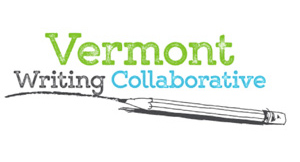Dear Friend of VWC,
“The score is in!”
To write well, students need a solid understanding of what they are writing about, and the skills to communicate effectively.
The Vermont Writing Collaborative’s new and expanded Summer Institute will give you the ESSENTIAL tools you need to help students – in your classroom, school, or district, at all grade levels — become effective, thoughtful writers.
“Come and join us!”
So begins the brochure announcing the Vermont Writing Collaborative’s 2016 Summer Institute! It’s going to be pretty exciting!
After hearing from MANY of you around the country about what your needs are, we have re-designed the (legendary!) Summer Institute.
In this issue of the newsletter, we give you what we hope is a tantalizing glimpse of what the new VWC Summer Institute holds.
First, though, we take you back a bit in time, to a story that reminds us how important for all of our students learning to “write for understanding” is — and how important it is for their teachers to know how to help them.
Please read on — we welcome your feedback!
“Aha!” Lightbulb Moments
The Score Is In:
Capable Kid, 1: Ignorance and Frustration, 0
Steven was definitely a struggling reader and writer. In the 8th grade, he was reading at about a fifth grade level — and his writing was lower than that.
Yet there he was on the first day of the reading/writing local assessment, head buried in the text (the short story “Building Bridges” by Andrea Davis Pinckney, a text that would have been deemed “too hard” for him by any test score).
Steven’s pencil was in his hand. Oblivious to the world around him, he was going back over the text — over and over — underlining passages, making notes on his notes sheet, going back to the text again.
Steven worked like that for an hour and a half, never speaking. By the time he was done, he had written an essay of about 8 — 10 paragraphs.
The focus / thesis he had been asked to work with was “Mama Lil is a complicated character”. He had supported that thesis thoughtfully, and accurately, with evidence from the text. His essay had an introduction and a conclusion, and it all made sense.
Big Picture: Steven’s writing (complete with spelling errors and sometimes-enigmatic sentence structure) showed his clear understanding of the story — which he had read independently. And it was so clearly organized that any reader could easily follow his thinking.
The score?
Capable Kid, 1 — Ignorance and Frustration, 0
What was going on here? We can never really know what is going on in a student’s head, of course, but the teacher could not help thinking that if she could have listened to Steve’s inner conversation with himself, it might have been something like this…..
“Okay, I just read this story. I didn’t get it very well the first time…
“But, hey! I do know what it feels like to understand a text, from all those other stories we read and wrote about. That understanding feels a lot better than this…
“So, I think I’ll read it again and make all kinds of notes.
“In fact, maybe I’ll just keep doing that until I get it. That worked before…”
Steven’s finished piece would (probably) not have been confused with that of one of his more fluent classmates. On a state assessment, his essay would (probably) not have met the standard.
Not quite.
But… it was close. Steven had worked his way through a piece of complex text that he had helped himself understand. He showed that understanding in a structured, accurate piece of writing that allowed the teacher to follow his clear thinking.
Steven was well in the game. It was a victory for everyone!
Vermont Writing Collaborative
Summer Institute Alert!
Why You Need to Come to the 2016 Vermont Writing Collaborative Summer Institute
Us: The NEW 2016 Summer Institute is all about tools!
You, a Committed Educator: Really?? What kinds of tools??
Us: Well, you’ve been reading all about these “Rules of Three”, right?
You, a Committed Educator: Why, yes! Yes, I have! Are you going to be sharing those materials at the Summer Institute?
Us: Indeed we are — we are getting together so many great tools to share with you that it will take a great big tote bag to carry them all!
Interested Folks: Wow, sounds fascinating. Can’t wait to hear more!
When: June 27 — July 1, 2016
Where: Vermont’s beautiful Lake Morey Resort in Fairlee, Vermont
Highlights of the Week
Writing for Understanding Sequences: take the mystery out of teaching writing
Real Teachers, Real Students, Real Results: learn what works from teachers “in the trenches”
Activities for Close Reading: support students in working with complex text K-12
Research Packs: guide research and text based writing with these clear and simple tools
One Fell Swoop: see how to teach all three Common Core writing types in one rich chunk of content
Lakeside Learning: Share ideas with colleagues in a beautiful, lakefront setting
Click here to register now!
Please share this newsletter with your friends and colleagues. We are trying hard to spread the word, in the era of the Common Core Standards, about how helpful Writing for Understanding can be for teachers and students of all ages!
Sincerely,
Eloise Ginty, Joey Hawkins, Karen Kurzman, Diana Leddy, Jane Miller,
Julie Morton, Marty Gephart, Kristin Armstrong
Vermont Writing Collaborative
